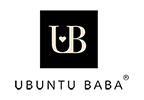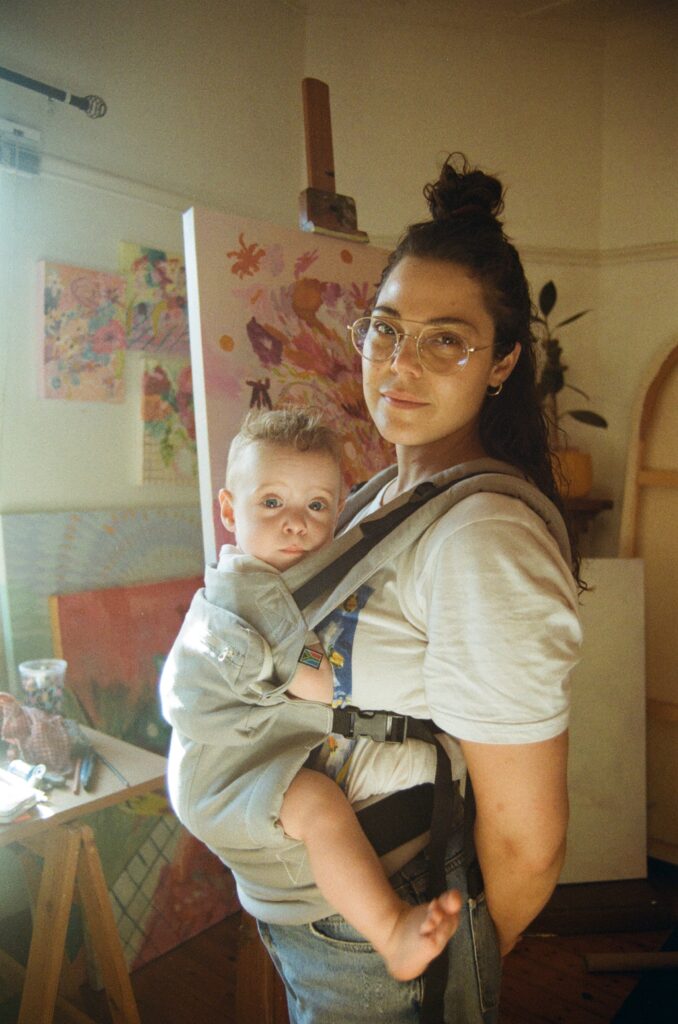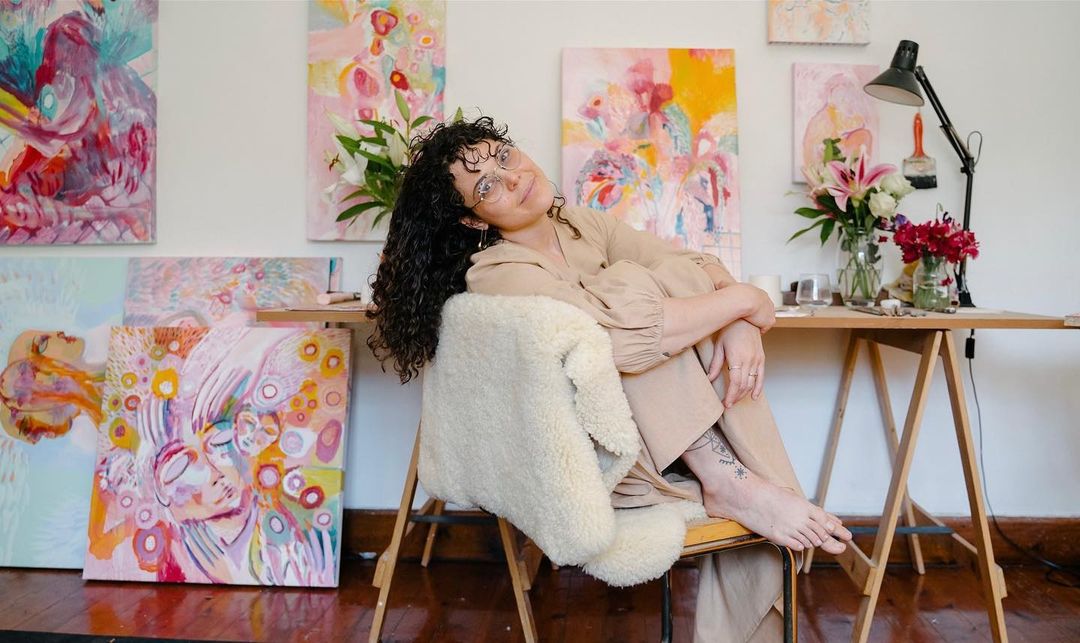
Amy Ayanda captured by Koa Photography.
We sat down with Amy to learn more about her career as a creative, life as a mom of three and what motherhood means to her.
Thank you for taking the time to meet with us, Amy. You have three beautiful children, can you tell us about them?
There’s Frances; I had her when I was 22 – she’s six now. She’s quite something. She’s energetic and outgoing. She loves meeting new people, dancing, singing super loudly. She loves inventing things from little pieces of nothing. She’ll pick up a little piece of trash and turn it into this little thing for her doll house; it’s very sweet.
I recently had twins, Atlas and Jude. They are 15 months and busy. Atlas kind of reminds me of Frances, actually. He’s super energetic and very loud and boisterous and wants to throw things and push things and he’s obsessed with cars which is bizarre, but I guess it’s a boy thing. Jude is very quiet, calm, always smiling, inquisitive. He’s quieter and more introverted than Atlas, which I find so interesting because they’ve been like that since they were inside me. Atlas would kick me – he was head down, and he’d kick me constantly. And Jude was very quiet and still – to the point where I went to check on him twice because I was so worried.
They’re all Aquarius, all three of them. Frances was born on the 22nd of January, and the twins were born on the 26th of January. The boys came six weeks early, so we didn’t plan for their birthdays to be so close together.

Amy Ayanda and daughter Frances, captured by Koa Photography.

Amy Ayanda and her twins, Atlas and Jude, captured by Koa Photography.
Both boys have beautiful names, but Atlas is quite unique. Where did you get his name from?
I obviously went down the naming rabbit hole, as all moms do. Atlas was one of the names we liked, but we were almost afraid to name him Atlas because it seemed so different. Family members were like, “what are you going to call him for short?” and I was like, “it’s not a long name; call him Atlas”. So ya, it was a bold one. We also had Gabriel for him specifically. We decided to go with Atlas Gabriel because we couldn’t let go of Atlas.
What was the transition like, from 1 to 3?
Honestly, it was terrible. I feel like I’m only just coming out of the haze and shock of going through it. Frances’s birth was totally by the book. It didn’t give me any issues. I was also younger. My labour was relatively quick, my healing was quick. My breastfeeding journey was almost three years. That made me want to have a second baby, because it was so easy. Then twins, and twins coming early, and twins being in NICU for a month and then not being able to latch properly for more than a month. Then not being able to really (breast)feed for longer than 5 minutes at a time because they were used to the bottle. Exhaustion because I couldn’t try anymore – it was just too exhausting. I ended up breastfeeding and pumping for 11 months, and then I was like, “I can’t anymore”.
That’s an incredible achievement.
It was hard mentally and emotionally. It was easier to pump, but in the end, I was sitting for 40 minutes at a time trying to get enough milk out. It took too much of my time. There was a lot of birth trauma because Atlas came out vaginally and Jude was a caesarian, so it was just mind-blowingly unexpected. Birth and breastfeeding trauma is no joke. I’ve been going to bodywork therapy and all of the body, mind, and spirit kind of healing cause it shook me. It was like, “it’s going to be this beautiful natural thing that kind of flows,” and it just wasn’t. None of it flowed. And like two – it’s just a lot.
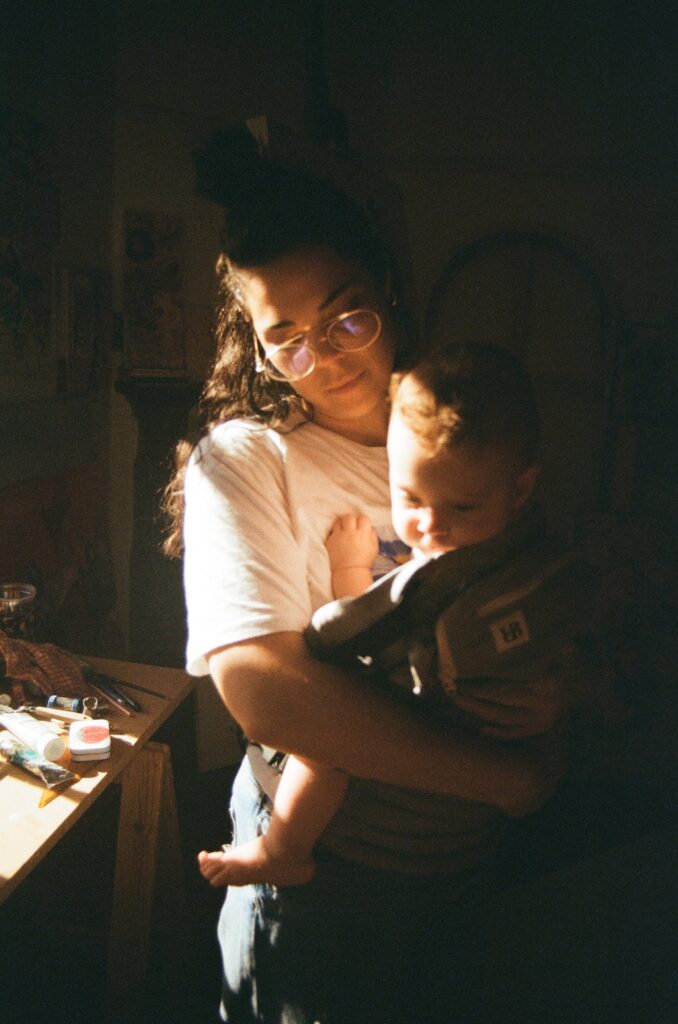
Amy Ayanda and Atlas, captured by Sitaara Stodel.
Frances is so good with the boys, how did she take the change?
It was scary for her, but again, she just flows into things. It’s a big part of her personality. I think it’s because she’s an Aquarius. It’s hard and she’ll say it’s hard, but she kind of flows through it once she’s felt it. Having twins was not the hardest thing for her. We had to move because we grew out of the little cottage we were staying in last year and that was her whole world, so that really shook her. But when it comes to her brothers, she’s never gotten angry or frustrated. The age gap made a huge difference, she was really able to come into her role as a big sister. Having her own thing, her school, was also a big part of it. She loves it so much and that went a long way in helping her cope. She has the space and repetitiveness of doing the same thing every day, I couldn’t have given her that.
Are the twins in a playgroup too?
The twins are home. I had Frances home with me until she was four and then we took her to a Waldorf school, and I think we’re going to do the same for the boys. We both work, so we have a nanny three days a week and Monday and Friday are my days with the boys, which I still really love. I don’t know – I’m not ready to let go of that role. I never had a nanny with Frances, so that experience of looking into a fish bowl of someone taking care of your kids and you’re kind of walking around getting work done is awesome because I can actually still do my stuff – but it’s hard and there’s a lot of weird guilt that I feel, often. So I still want to keep those two days with them, it’s really important to me. We recently got a weekend nanny because we just realised it was too hard to relax sometimes, so that was something we made a decision on instead of getting someone for the Monday and Friday. It’s worked out really nicely, actually.
What does motherhood mean to you?
Motherhood with Frances was something I just fell into, and it felt so much a part of me. After the twins, I was very much in the thrust of postpartum depression, which is not what anyone wants to go through when they become a parent again. I guess all those preconceived ideas of what I thought motherhood was going to be like shattered, and I had to figure out my definition for it again while trying to work through the trauma of everything. Even though I was struggling, I was getting up and doing something. Even though we go through these difficult things, we show up. For me, that repetitive caring, nurturing, loving cycle is the definition. It’s the act of getting up and doing it. The baby is going through these precious moments the first year, and it goes so quickly. All of a sudden, they’re walking and talking, and you have to take it down a notch, so you soak that in and try your best to be there. Be present. The act of showing up is where it is for me, and it doesn’t matter if there are moments you can’t be there – it’s about the moments you are showing up for your kids.
You mentioned you’re just coming out of that haze of postpartum depression and that you had a lot to work through. What advice would you give to someone currently in the throes of it?
Prioritise yourself. It’s a dangerous, scary thing. Luckily for me, I was never in a position where I didn’t want to be around my kids, but I think that can develop. The last thing you’d want is to not be around your children during such an informative time when they’re just fresh in the world. But at the same time, I had to prioritise therapy. I did TRE therapy which is body trauma therapy; it’s actually an incredible thing to do after experiencing something physically traumatic. Obviously, I feel like it’s a bit of a luxury to some – not everyone can afford therapy. There are all sorts of amazing moms, and if you are a part of a community, they will be able to guide you in the right direction. I think that when moms go through this they isolate themselves. For me, it was radical independence when I was dealing with the trauma because I didn’t want to talk about it, so I would pull away from everything, but it’s the worst thing you can do.
What does self-care look like for you now?
Self-care is just taking time for myself. That’s it. It could be lying in bed; that’s probably the best, lying in bed. I go to the gym three times a week, in the mornings once my nanny arrives. Exercise definitely helps, even if it’s just a walk, because you’re releasing endorphins and you’re taking yourself outside of yourself for a moment. Even making myself a cup of tea. Say you absolutely cannot do something else – that’s how it started; I had to be really strict. And I actually took up pottery classes again. I used to do it when Frances was little; you leave the house and make pots with a bunch of gals and drink wine. I love it, and I get to come home with a big bowl I wanted for my house. That was something I gave myself. Quite indulgent, but it’s the best. But it doesn’t need to cost money – it really doesn’t.
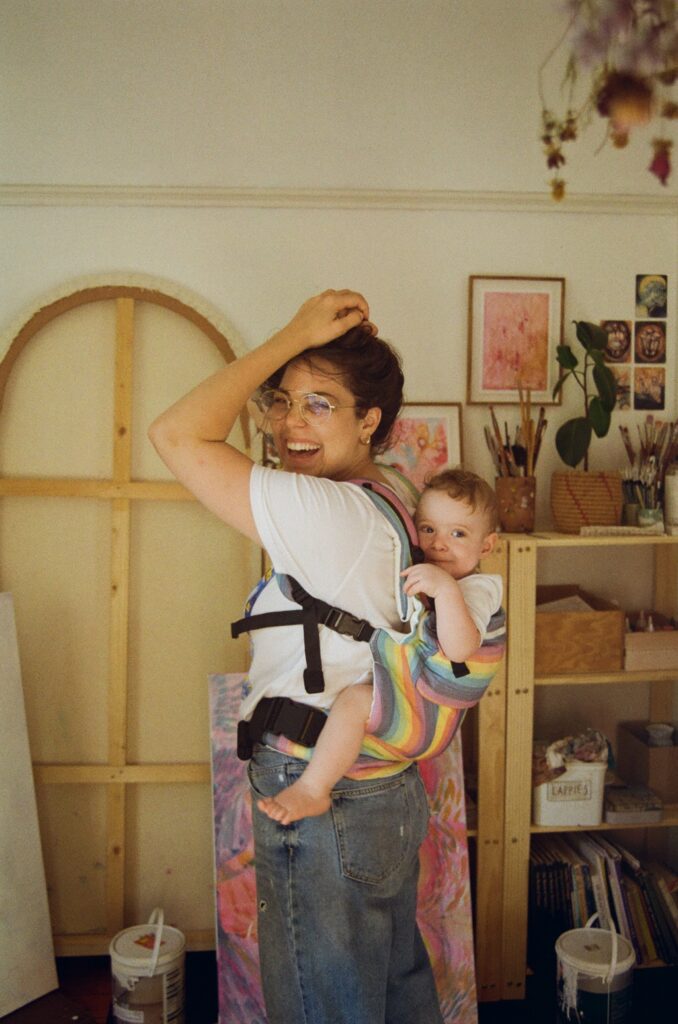
Amy Ayanda with son Atlas in an Ubuntu Baba Stage 2 Limited Edition, captured by Sitaara Stodel.
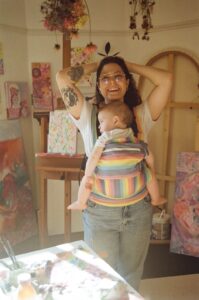
Amy Ayanda with son Atlas in an Ubuntu Baba Stage 2 Limited Edition, captured by Sitaara Stodel.
Tell us about what you do professionally and how you came to be where you are today?
When I fell pregnant with Frances, we started recording our first EP. It’s called Ab Ovo, which means “from the egg” – quite deep. I was going through losing my mom, so those songs were about the life cycle in a way, because I was growing a baby and dealing with loss. Most of the songs were about moments – with my mom, finding out I was pregnant.
My husband and I make music together, so he listens to the song I play, and we record it with his friend. He takes it to this place I could probably never do by myself. That EP did really well; we were approached by Platoon, a branch of Apple Music, and they offered us a deal. It allowed us to keep on creating with no financial stress. We don’t release as often as we want to because we also have jobs. My job is painting and running the store, and Dean works for a university. Before the university, he worked for a music school for 8 years.
There’s a part of me that wishes I could just sit and make music all the time, but it just doesn’t make enough money. Our label helped me pay for production lessons while I was on maternity leave last year. That allows me to have the freedom to just sit and record and create the bones of a new song by myself. I had no idea how to do it before, so doing that was really empowering. It’s an itch I wanna scratch, but it is an element of my brand and business, so I honour it and give it as much time as it needs. For the last year, I put it on the back burner cause I was just like, “I’m trying to get better”.
The business has the music side to it, but it’s not the main source of income. The main source is the art I create. For the most part, it’s grown super quickly. Like over lockdown especially, it was busy. People couldn’t buy booze. Now, post-COVID, my business is feeling it. The past five months have been hard. I’m creating art that’s supposed to be selling – and it’s not selling. It kind of does this weird thing to my brain. I’m also trying to honour that COVID happened, and there will be residual effects like this. It’s not because people don’t want to buy my art: it’s because it’s a hard time for everyone. But we push through, and I am invigorated because I broke my wrist and now I can use it (after six weeks), so I’m painting a lot which is really lovely. The postpartum depression coupled with the year starting off badly for the business made me feel like I didn’t want to make art. I guess I needed to break my wrist to realise I needed to paint again.
Was becoming an artist something you always wanted to do?
I’ve always painted. I don’t remember not painting. I started when I was three; I would draw very interesting things. There’s this one drawing I made of a girl with a heart just below her stomach where her womb is. I’ve always been keen on music as well. My brother and sister had already started music from Grade 1. I would watch them play the piano and beg my mom to do piano, but my parents had three kids, so the rule was no extra-murals until Grade 1. Grade 1 came, and I started piano – I was obsessed. I wouldn’t say I’m very good at music. I think I’m good at making melodies and with words, but in terms of my technical side, I have never been that good at reading music and chord progressions, it’s all a bit childlike the way I play. I don’t mind so much – I kind of embrace it now. Before, I was very embarrassed about it. My mom was always good at sight reading. She could put a giant piece of piano in front of her and just play, having never seen it in her life. I have never been able to play music like that; I would always play by ear. So I would learn the piece and then remember it because of the way it sounded.
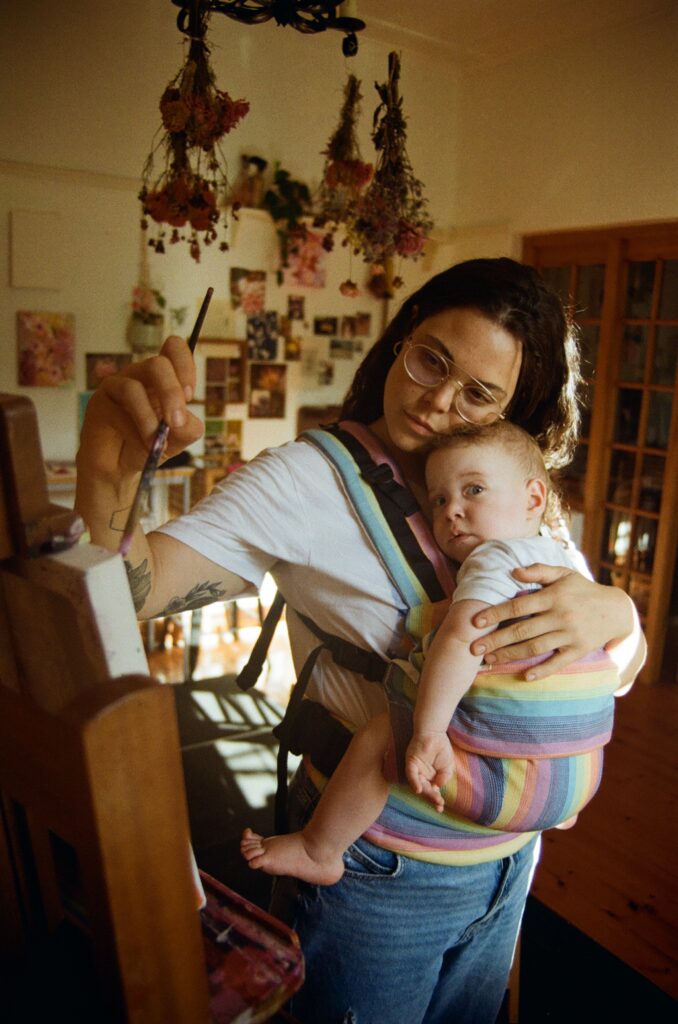
Amy Ayanda with son Atlas in an Ubuntu Baba Stage 2 Limited Edition, captured by Sitaara Stodel.
Has motherhood Influenced or changed your art at all?
It’s changed a lot. I became a mother straight after university. When I was studying painting, I was creating really big artworks with pressed and crushed flowers combined with paste; I would pour ink in-between and I’d paint oil on top, so it was quite textural. Finishing and becoming a mom as quickly as I did, I found myself not really knowing what kind of art I made. I was like, “I can’t sit and dry flowers the whole year. How am I going to make money?”. So I had to be innovative and think of new, fun, fresh ways to still create and make money.
I ended up waitressing straight after Frances was born because I panicked and soon found out that it was not sustainable working eight-hour shifts, pumping milk in the bathroom and going home with R200. Then I did a business course called Business Acumen for Artists, and I learned different skills in terms of creating a brand and developing a product. In the beginning, I was a little put off by that and didn’t quite know how to call myself a brand. I found myself looking at the people following me – like 1000 or 2000 – they really liked the work I was creating here and there but couldn’t afford my art. I looked at the people following me, and I looked at the money I was walking away with from my waitressing shift and I was like, “you know what, I could spend 8 hours making paintings and make four times the amount I made tonight if I sell them on Instagram“. So that’s what I did.
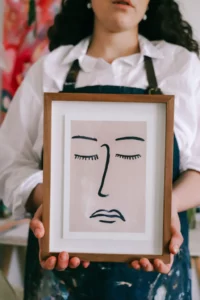
“Sad Girl” by Amy Ayanda.
I made A3 paintings and sold them for R300 each, and they sold so quickly. It felt exciting and a bit weird because I didn’t know if that was the way to sell art. Galleries didn’t poach me after university, which does happen to people, so my confidence was pretty shot in terms of the formal art world. I didn’t know how to establish myself as an artist, but I knew I needed to eat. I was going to paint what people wanted to see. Like pretty Matisse Line Drawings, and that’s when I created the sad girl face. She’s got a little curvy nose and closed eyes. I called her the Sad Girl and painted her on tote bags which I sold for R300 each. That was the basis of starting my business. Selling the pieces basically gave me enough money to make more. So, once I had a few orders for bags, I would buy more fabric and make more bags and then once I had a bit of money from selling originals I started scanning my artworks and started selling prints. At that point, it was not COVID and the Biscuit Mill was busy; that’s pretty much where it all started growing.
The work has changed a lot. There are a few things that I do the same, like pouring ink, always kind of playing with the idea of flowers and painting landscapes. The motherhood scenes and the humanity collection came after becoming a mom and what those feelings bring for me. There are themes that have stayed similar in my work, but in terms of how I create, it’s very different. I am actually collecting flowers again. I’m creating a slower body of work. I have no idea why I’m making the work, but I feel it’s important to go through as a creator and not just create for the sake of selling all the time.
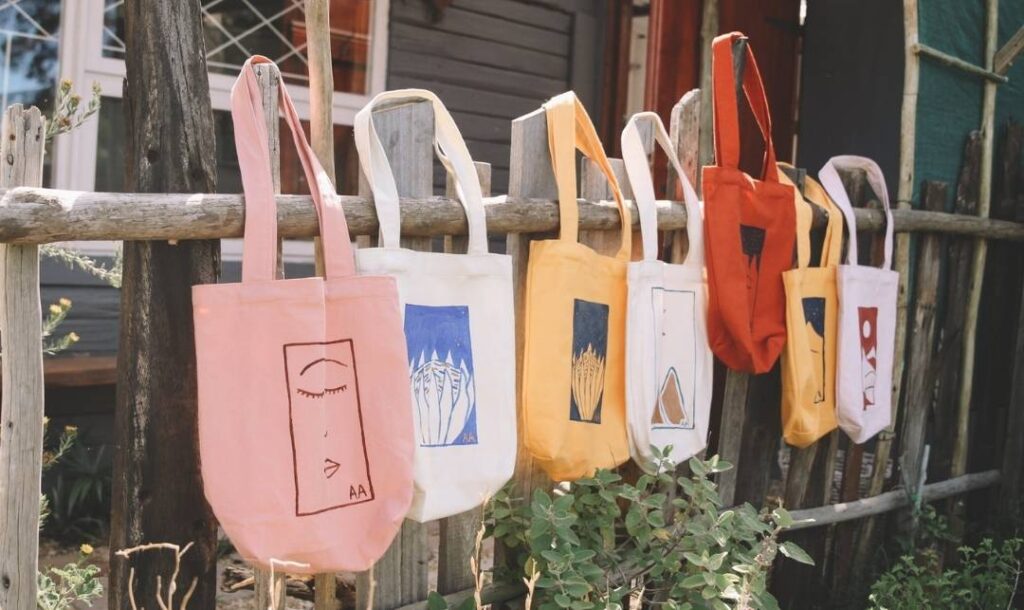
Tote bags by Amy Ayanda.
When do you feel most beautiful?
I feel most beautiful when my kids hug me. I feel very grounded within myself; I think that’s a big part of feeling beautiful. It’s not like an outward thing; it’s the safety you find within yourself. You can’t force kids to hug you, but when they hug you, and you don’t ask them to – it’s the best feeling ever.
Do you have any mom role models?
There’s this one woman – sew_trill. Christina Martinez – she’s a New York-based artist. She’s got two kids, and I just love her vibe. She’s a boss. She does amazing collabs, her kids are super cute and quite funny. She’s killing it. She’s doing all sorts of really cool clothing collabs and big shows. Sometimes I look at people like that with the blue tick and a million followers, and it doesn’t feel attainable to me. It feels like a foreign thing. I guess I wish something like that could happen for me, but I’m also like, it’s not possible.
Why do you think it’s not possible?
This is the hardest thing I’ve ever done. Trying to stand true and create an income from it because, before levels 5 and 4, I was still doing part-time jobs. When that stopped, I had to pivot completely to my business online. For the first year, it worked, but since then, it’s been hard. It’s hectic and does things to my spirit in terms of keeping up the brand and doing fresh, exciting things. The best part of my job is when I get campaigns, but it’s been quiet. I think big brands don’t have budget for that stuff and they’re looking to influencers to do smaller things. It’s hard, but I guess that’s also just part of it. That self-esteem – that’s part of the package when it comes to creating your own work and putting it out there and having a business. It’s important to put it into perspective.
Describe yourself to us?
I’m very sensitive to a lot of things, and my body responds intensely to things which is a great thing for me in terms of creating. I can just focus on being creative at that moment, but sometimes it’s not great because I get very low in my body and don’t quite know how to function. It’s always been a part of my personality growing up. I also think that I’m kind of like water.
Can you elaborate on that?
I just feel like a lot of people are like, “I don’t know how you do it”, and I just don’t think I’ve ever really gotten it right. A lot of the time I flow through things, and; it doesn’t mean it happens with ease. Sometimes it’s hectic and difficult, and I feel like I’m drowning. But sometimes, it’s a steady stream and feels comfortable. There are moments I feel like I’m not held enough within myself – I can imagine being completely spread out. That’s also where my partner comes into play – he very much holds it when it’s needed the most, like a vessel of sorts, and that’s where we complement each other.
What does being a woman mean to you?
I never thought of myself as a feminist or a strong feminine being because I don’t aggressively make that a part of my identity, but; it clearly is because I do these feminine things that you associate with being a female – female bodies, flowers. The act of being feminine can be many things. For a lot of women, and for me and my experience of women, I look to my mom and the people that shaped my idea of being a woman.
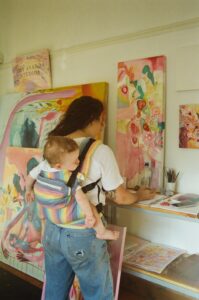
Amy Ayanda with son Atlas in an Ubuntu Baba Stage 2 Limited Edition, captured by Sitaara Stodel.
My mom had cancer for 22 years. She first got cancer when I was five and died when I was 27. That’s a long time to be sick and journey through the ups and downs of having your breasts removed, your ovaries removed, and pretty much all the things that made her feel like a female taken away from her, but; it never defined her. So even though she’d go through these ups and downs of being super sick, she would always bounce back into remission and just be a mom. I don’t think I ever saw my mom depressed about being sick, which is quite something because I was going through postpartum depression. I had moments where I couldn’t get out of bed, it was too hard, and I was sitting there thinking of my mom who would get out of bed for us and put on a smile. It was a way of protecting us, but it was also a way of protecting herself from that identity, and I think that’s what made her survive for that long. She just kind of did the thing; she showed up and survived, continuously. She made it look easy; I don’t understand how she did that. In retrospect, she really was going through it, but, as a kid, she was just so present, so there, never kind of falling and feeling sorry for herself and making me feel guilty. That, for me, was an act of feminism, a strong, active womanhood. The resilience is jaw-dropping; I guess that’s a big part of it. People look at women and are like, “I don’t understand how you did that”. It’s like this strength. It’s just there.
Do you think her strength through her illness helped you get through your postpartum depression? In the way you were proactive in saying you need to move forward and heal.
I had to be. I definitely am not over it; I have intense triggers. I can’t look at pictures of moms breastfeeding or birth pictures or videos because it triggers me too much. But I also think that’s okay, and it’s important to recognise things that might upset you and protect yourself from it. My mom being sick for so long was a trauma in itself, but I think that it put things into perspective for me in terms of how one deals with any form of body trauma. My mom did have therapy. There was just this tenacity inside of her, but she was also very calm. A calm, strong, loving being. I would go into her room and complain about some friend, and she would be like, “babes, that’s her stuff, don’t take that on”. She wouldn’t take on other people’s (issues). I get it – she was just going through so much that she had to filter out the stuff that didn’t matter. I wish I had that kind of filter.
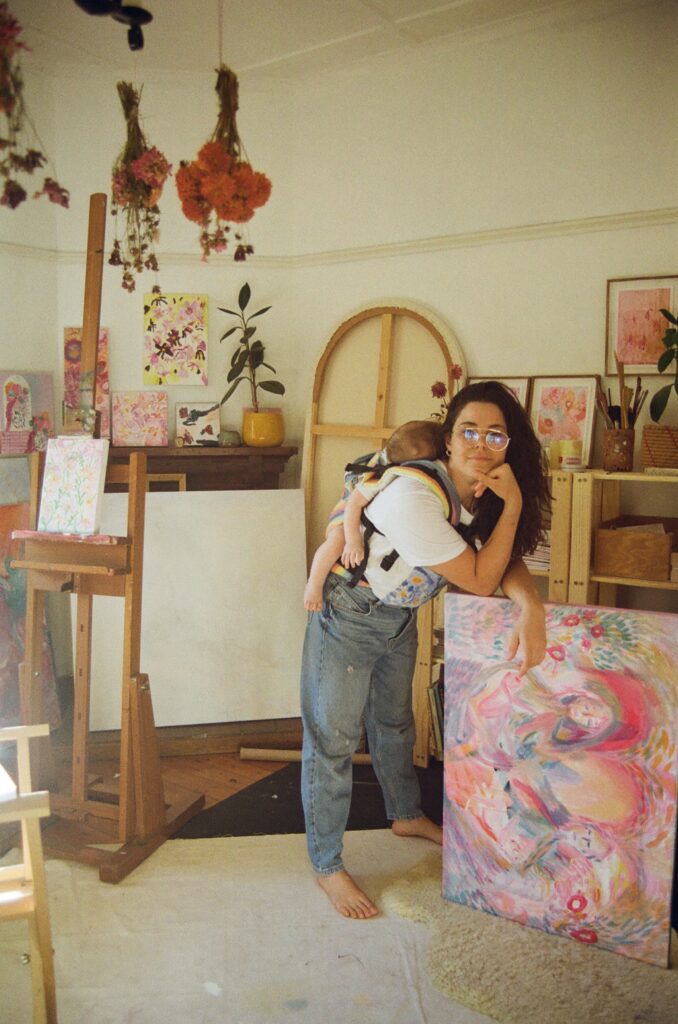
Amy Ayanda with son Atlas in an Ubuntu Baba Stage 2 Limited Edition, captured by Sitaara Stodel.
What are your motherhood essentials?
The first thing I set up was a postpartum six-week plan because I knew there wasn’t going to be time for much. We had a six-week meal train with family, which was invaluable. I also had a postpartum doula who came to my house with essential oils and gave me foot rubs, helped feed the babies, cooked us food, and helped with cleaning and anything we needed. We saved up for it, friends also contributed towards it. That was quite important to me because I knew I needed to rest, but I couldn’t because I was going up and down to the hospital.
Then our carriers, especially those first few months when we didn’t have a nanny. Dean worked remotely, and he had a standing desk; he would put a baba on him in a carrier and then I would have the other one in a carrier on me. Atlas had colic, so he couldn’t sleep lying down ever, so he was on Dean all day, every day.
Sleep training. Frances co-slept, and we still co-sleep with her. She goes to sleep in her bed and crawls into our bed around 3 / 4 o’clock. For the twins, we had to. Obviously, it depends on your situation and what you feel is best, but for us, it was invaluable. They’re sleeping through the night now, which gives us like 7 to 8 hours sleep – it’s crazy!
Then there are certain postpartum pillars like nourishing meals, community, and human touch – they’re all basic in that they don’t cost an arm and a leg.
What does babywearing mean to you?
I didn’t get skin-to-skin after (the twins) were born; they had to be on oxygen and were strapped onto machines for a month. Babywearing after that experience was so important because it brings them back to being on you. I had them in a wrap together in NICU and when we first got home. They were so small that I had one on each side.
Now, the carrier saves me every day because at least one will be whining at a time, so if I have the one on my back, I can hold the other one in the front. The Stage 2 is such a gamechanger in terms of putting them on my back. Jude’s going for grommets; he hasn’t been able to sleep lying down because he’s got so much liquid in his ears, so I’ve just been putting him on my back in the afternoons to nap while I cook supper or do something. It makes such a difference.
Babywearing means closeness and comfort but also means that I am able to do what I need to do because it does not stop. It gives me the freedom to do what I have to in the most practical sense of the word. It really just makes life so much easier. It gives me hands. Which is a big one. We’ve got a twin pram for them, but they hate the pram. Having them in the carrier calms them and gives them that closeness.
Thank you for being so honest and raw with us, Amy. We loved getting to know you!
Please consider the following resources if you or someone you know is struggling with postpartum depression: FAMSA or South African Depression And Anxiety Helpline.
Follow Amy on Instagram @amyayanda or view Amy’s work at amyayanda.com.
